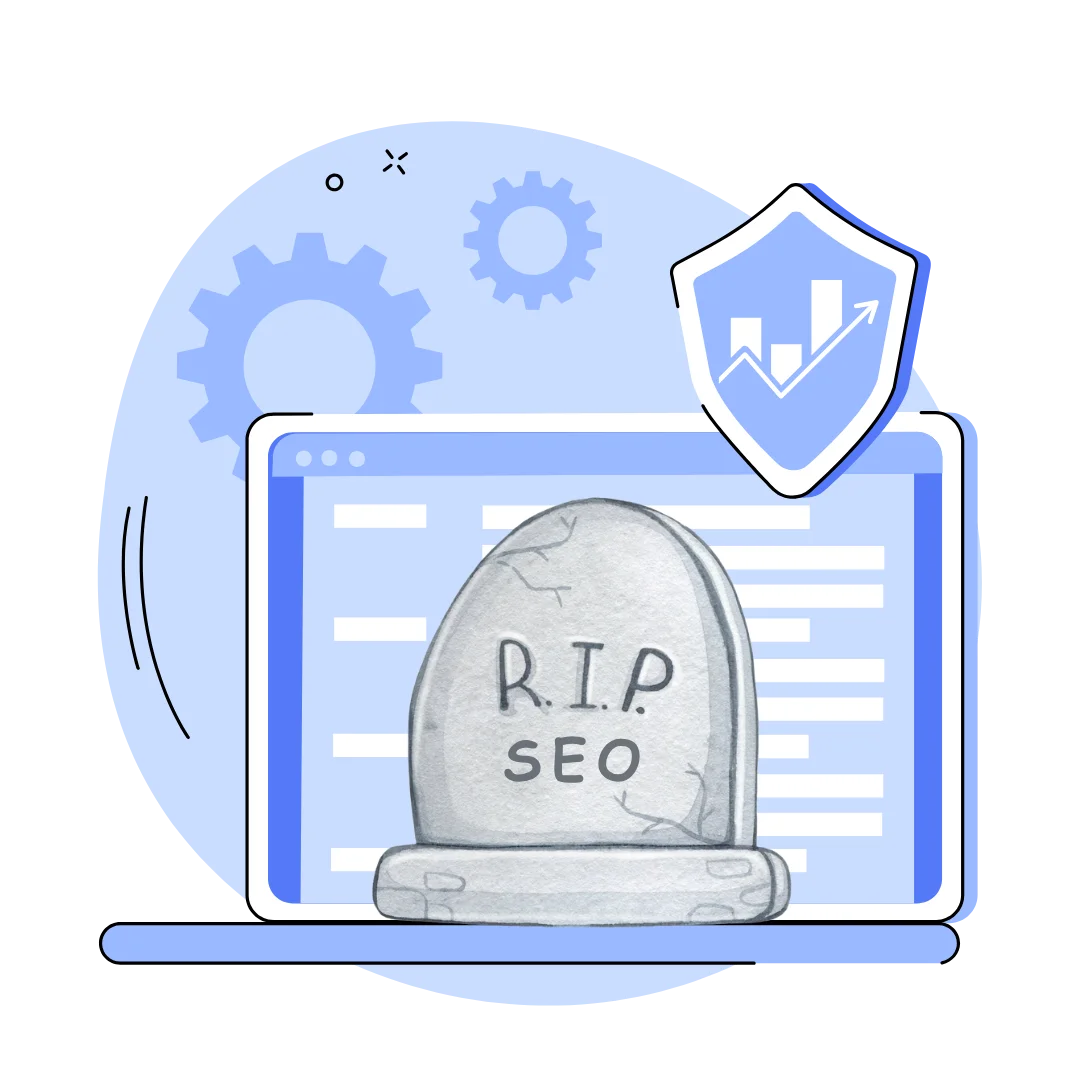TL;DR
Looking to improve your local visibility and outrank competitors in map packs and nearby searches? This guide breaks down the top 10 best local SEO tools, from local SEO reporting tools to local SERP tracking platforms that can help businesses, agencies, and enterprises dominate the local search landscape. Includes free local SEO tools, audit software, and enterprise options tailored for 2025.
To get discovered on local search is all the rage now. The intent-driven ecosystem has changed how people find local businesses and interact with them. The perfect match between cutting-edge AI and SEO has allowed the latter to capture customer intelligence and monetise through hyper-personalised services in real-time. This strategic shift has only driven competition to an all-time high. Now, you are not just competing with your next-door rivals but also businesses falling under a different geography because online marketing has bridged the distances between brands and customers. Therefore, local SEO has outgrown the optional SEO tactic tag into a non-negotiable growth driver.
In 2025, businesses that thrive will be those harnessing the best local SEO tools to dominate local search results, manage reputations, and stay ahead of competitors.
What’s the Difference Between Local and Standard SEO?
SEO, or search engine optimisation, doesn’t necessarily mean ranking on Google for broad search queries. A standard SEO strategy, however, defines what’s mentioned in the first line, but there’s something called local SEO, which focuses on ensuring your business appears in searches made by people near you. Regardless of where they’re searching for businesses like yours, either on Google Maps, mobile devices, or desktops, local SEO is the one to consider.
For brands having a permanent in-store facility must understand this difference because local SEO isn’t about competing globally. It’s about being the first choice in your service area.
Difference Between Local and Standard SEO
| Aspect | Standard SEO | Local SEO |
| Goal | Increase visibility on national or global search results. | Dominate searches within a specific geographic location. |
| Target Audience | A broad audience with a general interest in your product or service. | Local customers are actively looking for services “near me.” |
| Keywords | Broad terms like “digital marketing agency” or “B2B SaaS tools”. | Geo-specific terms like “digital marketing agency in London” or “IT services near me”. |
| Search Results | Mostly organic listings across websites. | Includes Google Business Profile results, map packs, and reviews. |
| Ranking Factors | Content quality, backlinks, site speed, and on-page optimisation. | In addition to standard factors: proximity, NAP consistency (Name, Address, Phone), local citations, and reviews. |
| Best Tools to Use | General SEO tools (Ahrefs, SEMrush, Moz). | Local business SEO tools, reporting tools, SERP tools, and the Google Local tool for an SEO agency. |
| Measurement | National/global keyword rankings, backlinks, and traffic volume. | This involves monitoring map pack rankings, call leads, direction requests, and GEO-tagged reviews. |
| Best Fit For | Online-only businesses or companies targeting a broad audience. | B2B or B2C firms with a physical location or defined service area. |
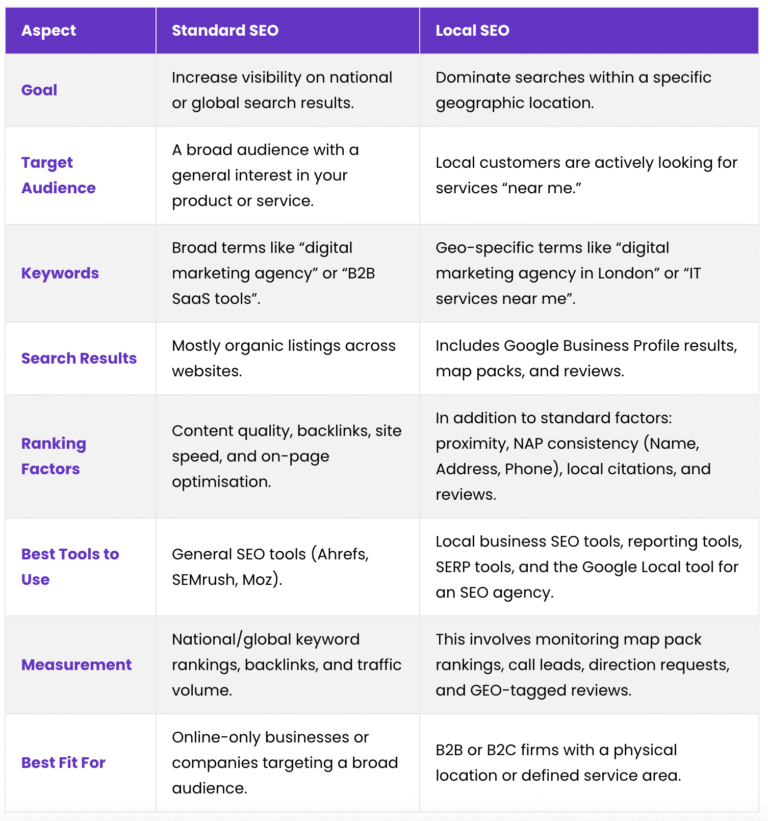
Understanding the Mechanics of Local SEO
Think of local SEO as the digital equivalent of a shop sign on a busy high street. Instead of waiting for customers to stumble across your business, you make sure they see you first when they search locally.
Here’s a breakdown of how local SEO works:
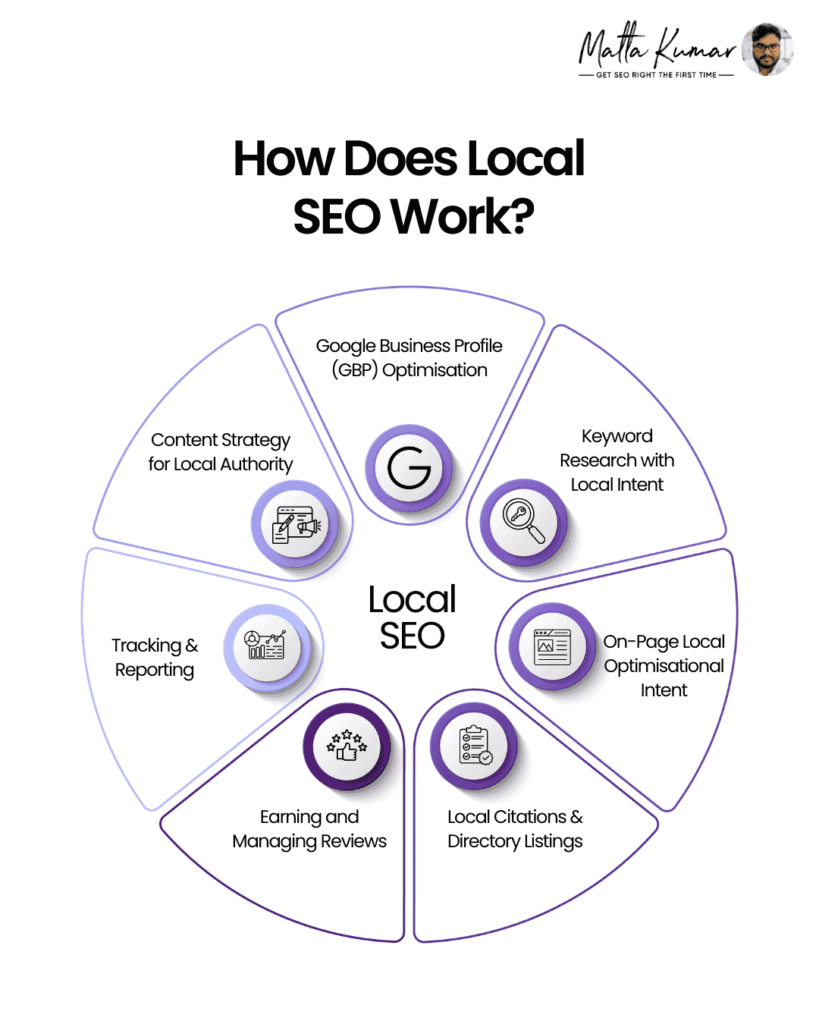
1. Google Business Profile (GBP) Optimisation
- Claim and verify your Google Business Profile.
- Add accurate business details (NAP), opening hours, and service areas.
- Upload photos, showcase reviews, and keep your profile regularly updated.
Tools to use: Local business SEO tools and Google Local tool for an SEO agency.
Studies suggest that 83% of consumers visit Google to discover and decide on local businesses for their requirements after checking online reviews.
2. Keyword Research with Local Intent
- Focus on queries, like “best IT consulting firm in Manchester” instead of just “IT consulting firm”.
- Use tools for auditing local SEO or enterprise-focused tools if you manage multiple branches.
Example: Free local SEO tools are available for smaller campaigns.
3. On-Page Local Optimisation
- Add location-specific landing pages (e.g. /services/seo-london).
- Insert schema markup for addresses and service areas.
- Use geo-keywords in title tags, H1s, and meta descriptions.
4. Local Citations & Directory Listings
- Ensure your business details are consistent across platforms like Yelp, Bing Places, and industry-specific directories.
- Consistency boosts credibility in Google’s local algorithm.
5. Earning and Managing Reviews
- Reviews impact trust and rankings.
- Respond to both positive and negative feedback promptly.
Pro Tip: Use local SEO agency tools for reputation management.
Another study shows that nearly 88% of US customers are more inclined to trust written reviews instead of star ratings.
Key Takeaway: Negative or positive Google reviews impact your customers’ buying choice and your website ranking for local SEO.
6. Content Strategy for Local Authority
Publish case studies, blog posts, and guides relevant to your service area.
Example: “The Future of IT Support in Birmingham Businesses”.
7. Tracking and Reporting
Use local SEO reporting or ranking tools to monitor progress and track metrics such as:
- Map Pack visibility
- Organic traffic from local searches
- Leads (calls, form fills, appointments)
- Engagement with GBP (directions, website clicks)
Pro Tip: Enterprise clients should consider an enterprise local SEO tool for multi-location tracking.
The Importance of Local SEO Tools in 2025
The old SEO playbook has become obsolete because AI Mode is squeezing organic visibility. AI has fundamentally shifted the entire course of local search across all channels, and both location-based businesses and large brands are impacted significantly. Thus, the spotlight is back on local SEO, and brands are adapting this strategy to optimise their nearby customers before competition steps in and steals the show.
AI and local search are rewriting the new rules of visibility and ROI in 2025; therefore, the best local SEO tools in the market can prove a game-changer for your business, too!
Let’s break down the reasons why your team needs the best tools in the market to dominate the local search.
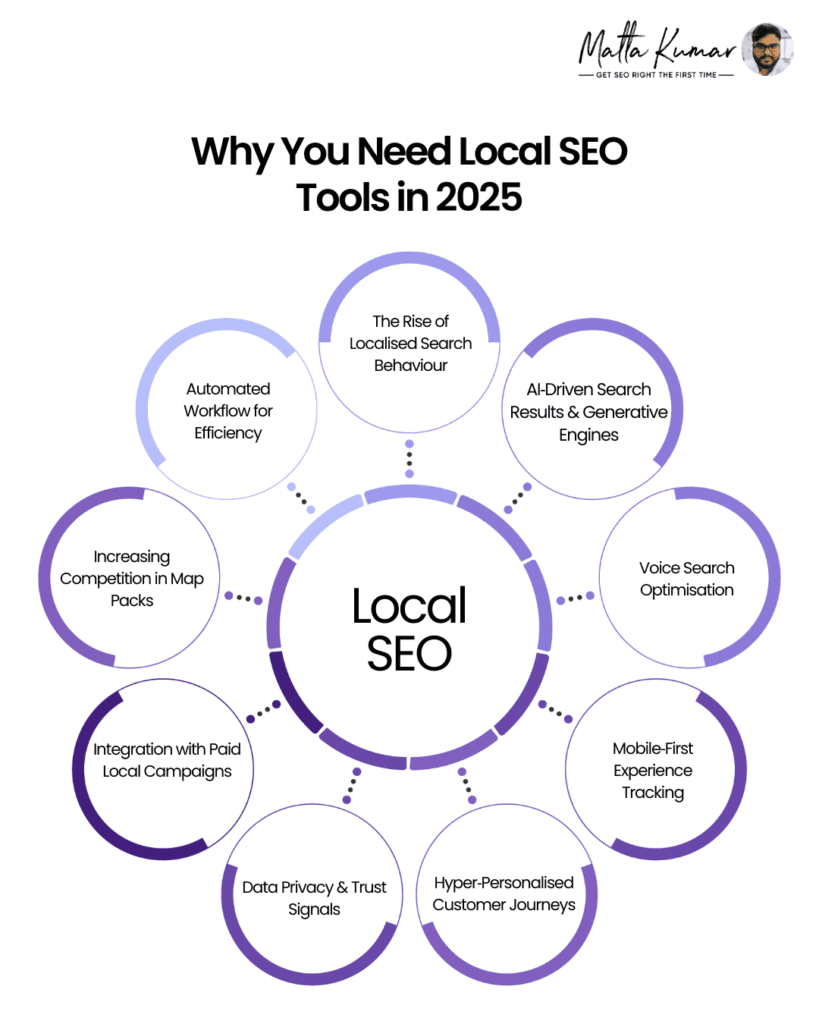
- The Rise of Localised Search Behaviour
Consumer habits have evolved, courtesy of localised search, which helps reshape how they discover and choose businesses for their services. Some statistics justify the importance of winning visibility in local search through effective local SEO implementation:- Direct commercial impact: Studies show that 78% of local mobile searches have resulted in offline/in-store purchases.
- A rise in “Near Me” and location‑specific queries: Customers expect instant results tailored to their exact location for “near me” searches, and precise geo‑targeted keywords.
- AI‑Driven Search Results & Generative Engines
Google AI Mode and other generative engines prioritise brand mentions in conversational answers. Tools for local SEO can ensure your business information is accurately represented in the same answer summaries alongside traditional SERPs. - Voice Search Optimisation
Voice assistants empower users to find products/services with natural, spoken queries like “best coffee shop near me.” Search marketing tools for local businesses can help optimise your website for these conversational keywords. - Mobile‑First Experience Tracking
Most local searches happen on mobile. The best tools now include mobile usability reports, ensuring your site loads fast and is easy to navigate on the go. - Hyper‑Personalised Customer Journeys
Consumers expect search results tailored not just to location, but to the intent and behaviour. Tools for local business search engine optimisation provide insights into audience behaviour, enabling you to deliver offers that convert. - Data Privacy & Trust Signals
Today, consumers look for trustworthy brands. Tools tracking reviews, reputation, and structured data can help build the trust signals for your brand that search engines now prioritise. - Integration with Paid Local Campaigns
Many enterprise local SEO tools now align with paid local ad data, giving a holistic view of organic + paid performance in your target regions. - Increasing Competition in Map Packs
With even small businesses investing in SEO, competition for the map pack is fiercer than ever. Specific local SERP tools provide the granular data needed to outpace rivals. - Automated Workflow for Efficiency
Manually managing dozens of listings and reviews is no longer feasible. The smart assistant tools automate updates, reporting, and alerts; thus saving time while improving accuracy.
What to Expect from Top Local SEO Tools?
The local SEO tools are primarily designed to simplify complex local optimisation tasks while delivering actionable insights.
Here are a few highlighted features to check out:
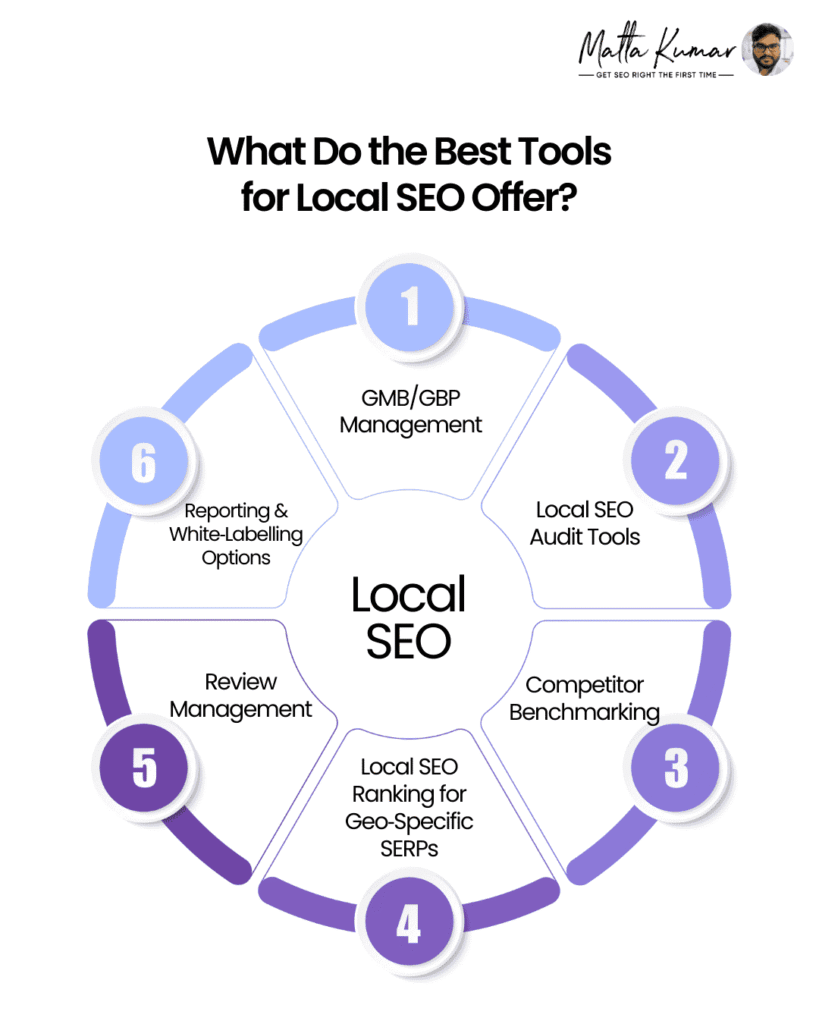
- GMB/GBP Management
Manage your Google Business Profile (formerly Google My Business) and streamline updates, post scheduling, and performance insights to ensure your brand is always visible. - Local SEO Audit Tools
From listing accuracy to NAP (Name, Address, Phone) consistency, local SEO audit tools help businesses uncover gaps that cost them visibility in local SERPs. - Local SEO Ranking for Geo‑Specific SERPs
You can track keyword performance at the city, postcode, or even street level, and witness what your customers see. - Competitor Benchmarking
Understanding what nearby competitors are doing is essential. But knowing how you measure up is more crucial. The best tools can assist you in both these areas, right from providing insights on competitors’ rankings and reviews, to identifying new local strategies. - Review Management
Reviews directly impact local pack rankings and customer trust. Leverage local business SEO tools to monitor sentiment, respond quickly, and showcase credibility. - Reporting & White‑Labelling Options
Digital marketing agencies can use reporting tools on local SEO to maintain professional, client‑ready dashboards, export various data, and or integrate ad hoc tools for numerous white labelling tasks.
Top 10 Best Local SEO Tools for 2025
| Tool | Key Feature (One‑Line Summary) | Starting Price (Approx.) |
 |
All‑in‑one platform: rank tracking, citation audits, reputation management | From $39 / month per location. |
 |
Geo‑grid map ranking tool offering flexible credit packages | From $24.99 / month (Starter: 90k credits). |
 |
GMB posting scheduler, geo‑tagging, and grid tracking per location | From $39 / month to $200 / month. |
 |
Citation finder, rank tracker & reputation builder modules | Tools from $14–200 / month, plus services from $499 / month. |
 |
Simple geo‑grid tracking for Google Business Profile activity | From $1.95 / month to $197 / month. |
 |
AI‑powered GMB management: content generation and review replies | $29+ per month, per location; free plan available. |
 |
Multi‑engine, geo‑specific rank tracking with automated reporting | $9 for a 7-day free trial. $99.00 flat rate per month. |
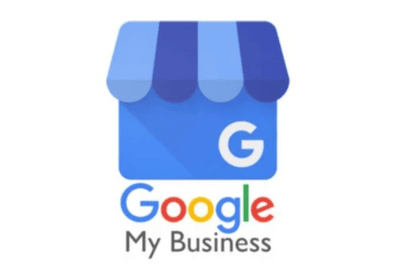 |
Free tool from Google: direct access to GBP posting, insights, and reviews | Free (native). |
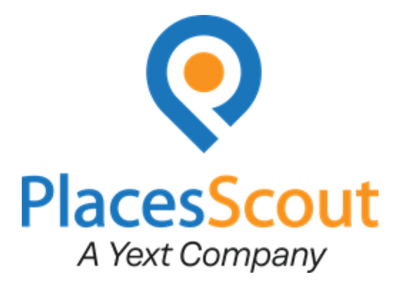 |
Deep automated local SEO audits—400+ data points and visual reporting | Approx. $1,200 / month on average. Pricing is available on request. |
 |
Complete GBP optimisation, listing management, and review AI tools per location | From $30 / month per location (Basic) or $50 for the Essentials tier. |
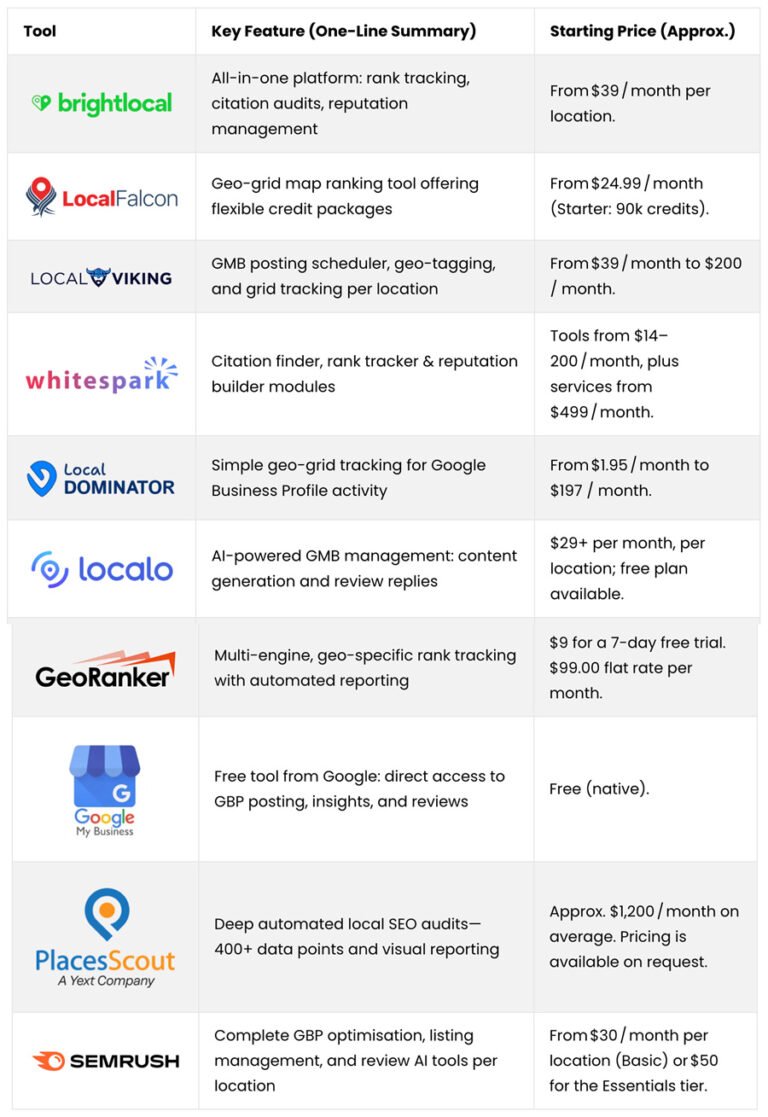
Businesses seek reliable platforms to manage, track, and scale local presence. From GEO-grid rank tracking to Google Business Profile optimisation, these ten tools lead the field for 2025 for citations and AI‑powered responses.
Here’s a guide to choosing what fits your agency or enterprise needs.
BrightLocal
BrightLocal is one of the most widely used all‑in‑one local SEO platforms, making it a top choice for agencies and other businesses that want both tracking and management in one place.
Key Features
- Local Rank Tracking: Monitor keyword performance across specific cities, postcodes, and map packs.
- Citation Audits: Identify missing or inconsistent listings across major directories.
- Reputation Management: Collect, track, and respond to customer reviews from a single dashboard.
- White‑Label Reporting: Create branded, automated reports for clients.
Others
- Pricing: Starts from $39/month per location. The higher plan will include advanced features like review monitoring and listing management.
- Best For: Agencies seeking an affordable, comprehensive tool for both local SEO reporting and client deliverables can consider this option.
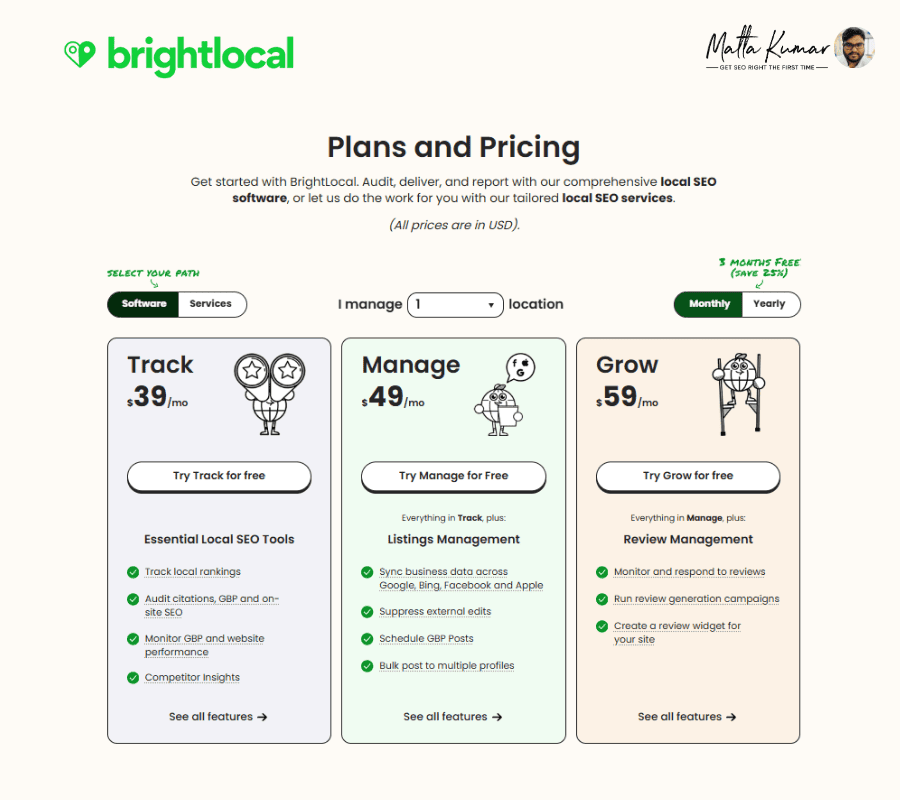
Pros and Cons
| Pros | Cons |
| Comprehensive platform covering rank tracking, reviews, and citations. | Some advanced features are locked to higher plans. |
| White‑label reports are perfect for agencies. | Learning curve for beginners. |
| Affordable starting plan. | No AI content generation. |
Local Falcon
Local Falcon is a GEO‑grid rank tracking tool that shows exactly how your business ranks across different parts of a city or region.
Key Features
- Geo‑Grid Heatmaps: Visualise how your Google Business Profile ranks block by block.
- Competitor Benchmarking: Track how nearby competitors appear for the same search terms.
- Unlimited Projects & Users: Useful for agencies managing multiple clients.
- Flexible Credits: Pricing is based on the number of scans you run.
Others
- Pricing: Plans start at $24.99/month for 90k credits. Advanced packages go up to $199.99/month.
- Best For: Businesses that want to see exactly where they appear (or disappear) in local search results.
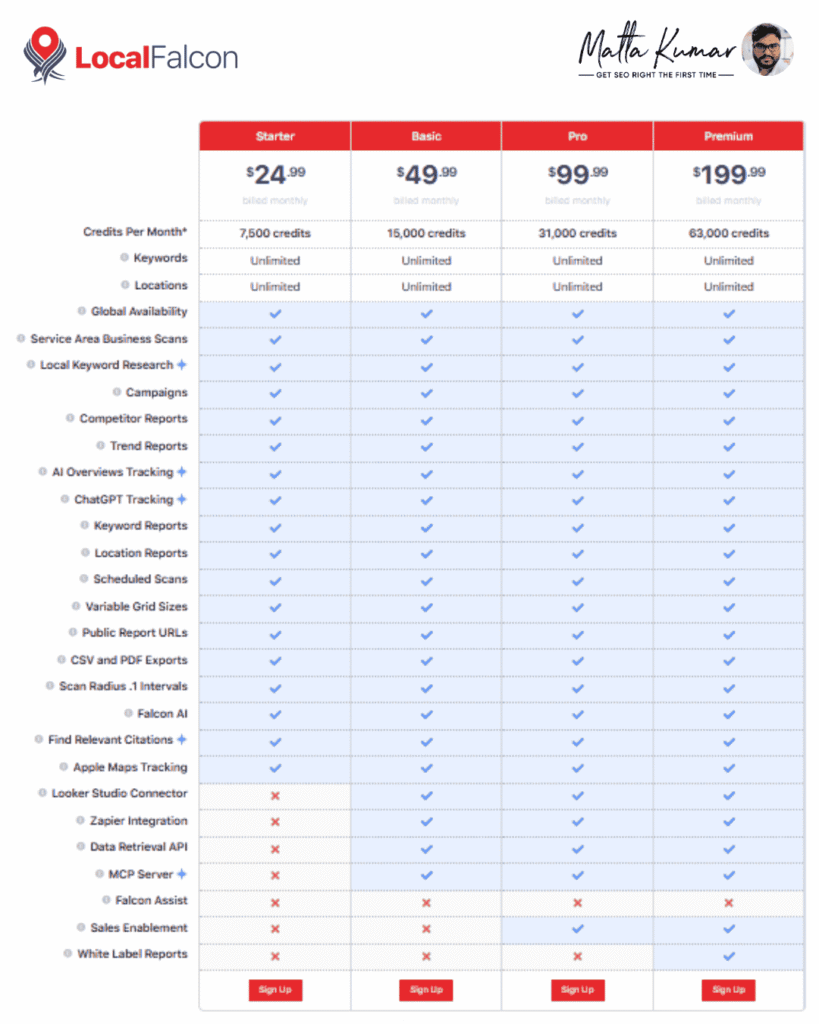
Pros and Cons
| Pros | Cons |
| Detailed GEO‑grid heatmaps for local SERPs. | Credit‑based pricing can become costly for heavy users. |
| Competitor comparison in the same grid. | Focused only on rankings, not citations or reviews. |
| Unlimited projects and users. | Requires pairing with other local SEO audit tools. |
Local Viking
Local Viking is a Google Business Profile management platform that simplifies posting and tracking.
Key Features
- GBP Scheduling: Plan and automate posts across multiple locations.
- Geo‑Tagging: Optimise posts with location data for better visibility.
- Grid Rank Tracking: Similar to Local Falcon, but integrated into the dashboard.
- Bulk Location Management: Useful for franchises or multi‑site businesses.
Others
- Pricing: Starts at about $39/month per location, with higher tiers for larger client portfolios.
- Best For: Multi‑location businesses are searching for a cost‑effective way to schedule posts and monitor rankings.
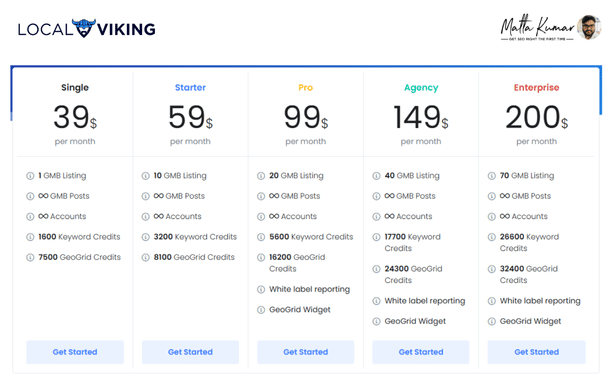
Pros and Cons
| Pros | Cons |
| Excellent for scheduling GBP posts. | Limited features outside of GBP management. |
| Affordable per‑location pricing. | Grid tracking is not as detailed as Local Falcon. |
| Good fit for franchises and multi‑location firms. | Reporting is less advanced than BrightLocal. |
Whitespark
Whitespark is a specialist platform for citation building and local rank tracking. It’s widely used by agencies that need high‑quality, location‑specific listings.
Key Features
- Local Citation Finder: Discover and manage citation opportunities to improve NAP consistency.
- Local Rank Tracker: Track performance across Google’s Local Pack, Maps, and organic listings.
- Reputation Builder: Collect and display customer reviews easily.
- Done‑for‑You Services: Agency plans include bespoke local SEO campaigns.
Others
- Pricing
- Citation Finder: $33–149/month
- Rank Tracker: $14–200/month
- Reputation Builder: $79/month per location
- Services: From $499/month
- Best For: Agencies are searching for a reliable partner to assist them in citation management and advanced rank tracking.
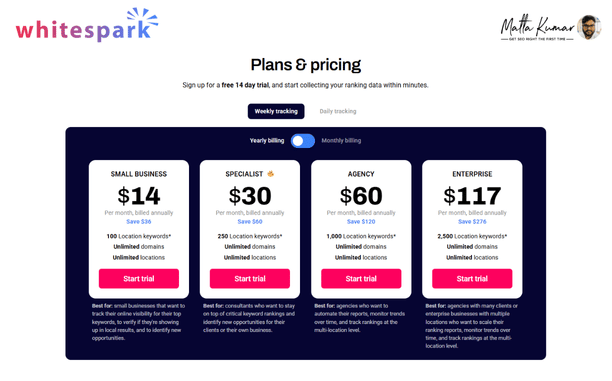
Pros and Cons
| Pros | Cons |
| Strong citation management and discovery tools. | Separate pricing for each module. |
| Great for NAP consistency. | Costs add up if you need multiple modules. |
| Trusted by agencies worldwide. | The interface is less modern compared to rivals. |
Local Dominator
Local Dominator is a simple geo‑grid tool designed mainly for Google Business Profile performance tracking.
Key Features
- Grid Rank Tracking: See where you rank across a specific radius.
- Focus on GBP: Limited to Google Maps / Local Pack monitoring.
Others
- Pricing: From $1.95 / month to $197 / month.
- Best For: Small businesses or consultants who only need geo‑grid rank data without extra features.
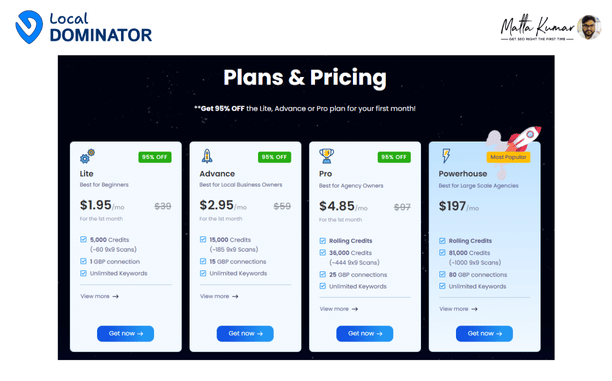
Pros and Cons
| Pros | Cons |
| Affordable compared to some competitors. | Focused mainly on GBP tracking. |
| Simple geo‑grid rank visualisation. | Few advanced reporting or citation features. |
| Suitable for consultants with a few clients. | Not scalable for enterprises. |
Localo
Localo is an AI‑powered local SEO platform that automates GBP optimisation.
Key Features
- AI‑Generated Posts: Create regular GBP updates automatically.
- Review Replies: Suggests AI‑driven responses to customer feedback.
- Performance Dashboard: Track ranking and customer interactions in one place.
- Free Tier Available: Good for testing before committing.
Others
- Pricing: $29+ per month, per location; free plan is available.
- Best For: Businesses with limited resources that want AI to handle GBP content and review management.
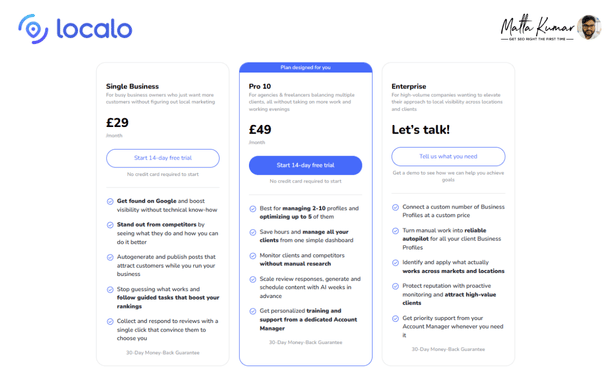
Pros and Cons
| Pros | Cons |
| AI‑driven content and review replies. | Pricing is not transparent. |
| Great for saving time on GBP management. | Limited integrations with third‑party tools. |
| Free tier available. | Less control for users who prefer manual edits. |
GeoRanker
GeoRanker is a data‑driven tool focusing on multi‑engine, geo‑specific rank tracking.
Key Features
- Multi‑Engine Tracking: Monitor rankings across Google, Bing, Yahoo, and more.
- Automated Local SEO Reports: White‑label options for agencies.
- Competitor Intelligence: See how rivals perform locally.
- API Access: Ideal for enterprises needing custom integrations.
Others
- Pricing: $9 for a 7-day free trial. $99.00 flat rate per month
- Best For: Agencies or enterprises managing clients across multiple search engines and regions.
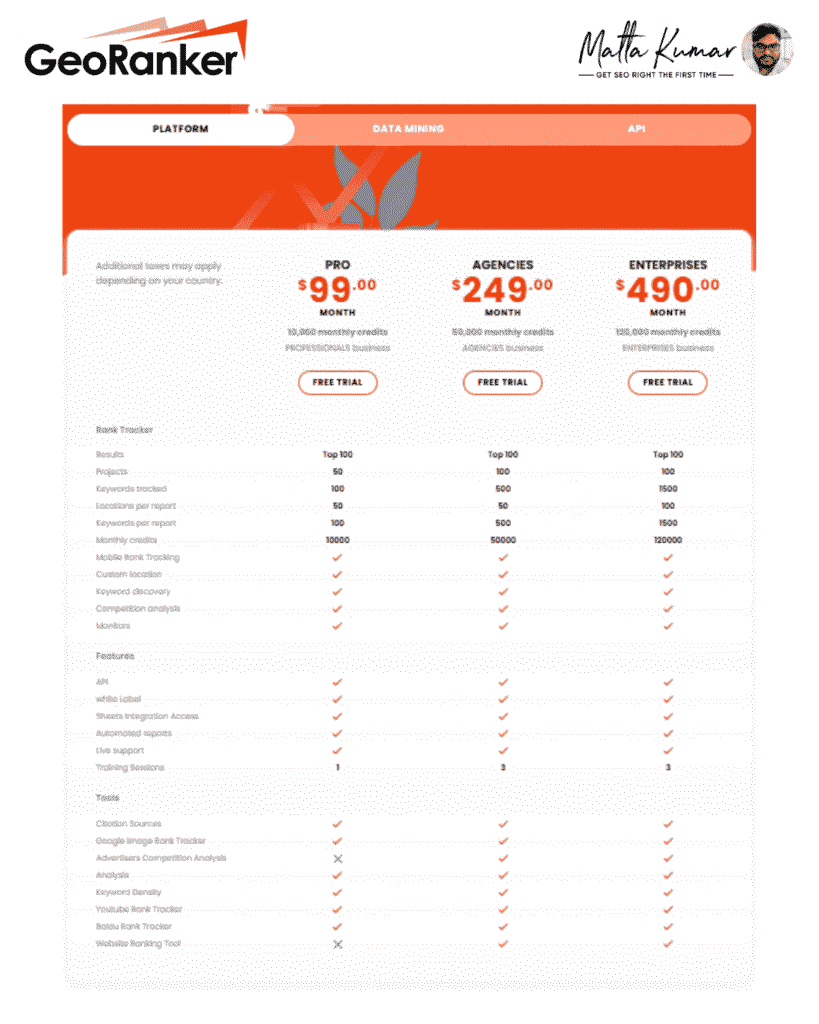
Pros and Cons
| Pros | Cons |
| Multi‑engine local rank tracking (Google, Bing, Yahoo). | Higher pricing tiers than some competitors. |
| White‑label reports are ideal for agencies. | It can be overkill for small businesses. |
| Competitor benchmarking and API access. | The interface can be complex for beginners. |
Google Business Profile (GBP)
GBP is Google’s free local SEO tool, essential for all businesses.
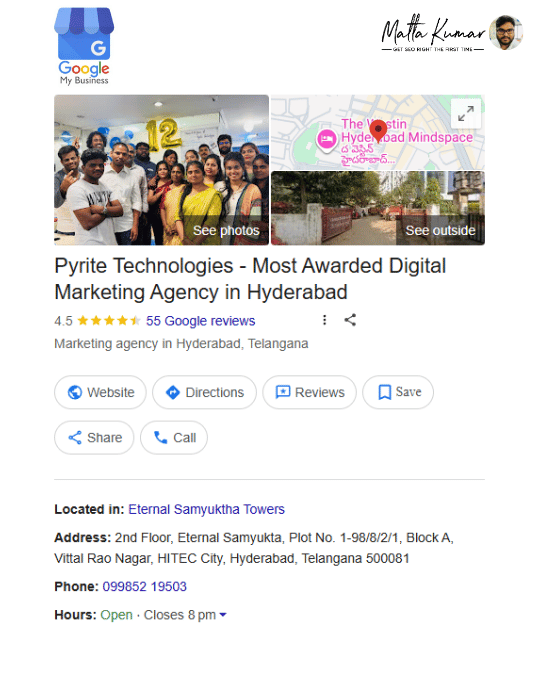
Key Features
- Business Listings: Add and manage name, address, phone, and hours.
- Customer Engagement: Collect and respond to reviews.
- Posts & Updates: Share offers, news, and events.
- Insights: Access data on calls, directions, and profile visits.
Others
- Pricing: Free.
- Best For: All businesses. After all, no local SEO strategy is complete without a fully optimised GBP.
Pros and Cons
| Pros | Cons |
| Free and essential for all businesses. | Limited to the Google ecosystem. |
| Provides valuable local insights and engagement. | Requires active management for best results. |
| Boosts credibility with reviews and updates. | Doesn’t handle citations beyond Google. |
Places Scout
Places Scout is a premium local SEO audit and reporting tool.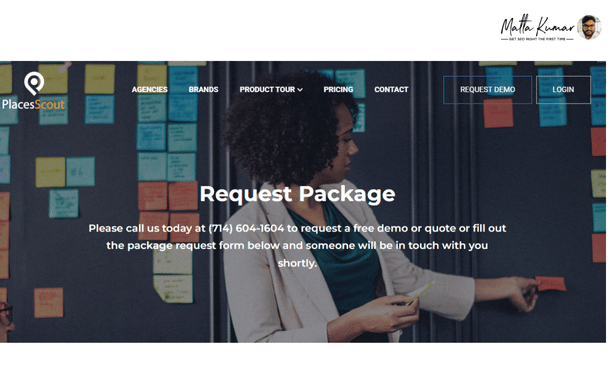 Key Features
Key Features
- Comprehensive Audits: Over 400 data points, including citations, reviews, and NAP consistency.
- Rank Tracking: Across both organic and map results.
- Competitor Analysis: Deep insights into rival local strategies.
- Custom Dashboards: Visual, shareable reporting.
- Pricing: This is an approximate figure – on average $1,200/month, though smaller packages may be available from $50/month per location. Prices are available on request.
- Best For: Large agencies or enterprises that need extensive audit data for multiple clients.
| Pros | Cons |
| Very detailed audits (400+ data points). | High average cost (~$1,200/month). |
| Powerful reporting dashboards. | Best suited for agencies, not small firms. |
| Covers citations, reviews, and rank tracking. | Setup can be time‑intensive. |
Semrush Local
Semrush Local integrates local SEO into the well‑known Semrush ecosystem.
Key Features
- GBP Optimisation: Automate updates, manage reviews, and post content.
- Listing Management: Sync details across 70+ directories.
- AI Tools: Auto‑generate posts and review replies.
- Performance Tracking: Monitor rankings and engagement at the location level.
Others
- Pricing:
- Local Basic: $30/month per location
- Local Essentials: $50/month per location
- Best For: Businesses already using Semrush who want local SEO integrated into one platform.
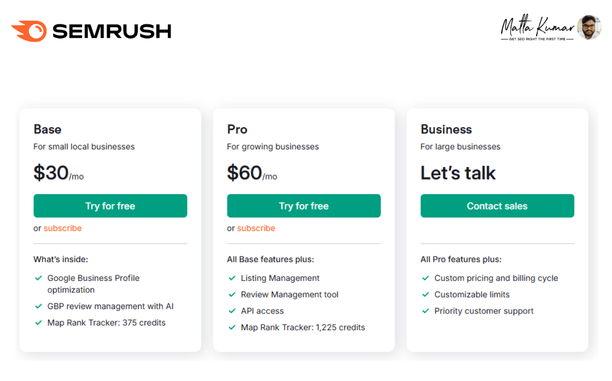
Pros and Cons
| Pros | Cons |
| Seamless integration with Semrush’s ecosystem. | Costs scale quickly for multi‑location businesses. |
| AI‑powered review replies and posts. | Some features are only available in the Essentials tier. |
| Covers GBP, listings, and reviews in one tool. | It may overwhelm beginners with too many features. |
Evaluating Agency vs Enterprise Needs for Local SEO Tools
While both agencies and enterprises require the best local SEO tools, their priorities differ significantly.
Agencies benefit from local SEO agency tools offering client management, bulk reporting, and Google local tool integrations.
Enterprises, on the other hand, require advanced governance, multi‑location dashboards, and robust competitor insights to protect market share at scale.
| Feature / Need | Agencies | Enterprises |
| Client Management | Require local SEO agency tools that support multiple clients with easy switching and dedicated dashboards. | Focus on managing internal teams and departments instead. |
| Reporting | Depend on white‑label local SEO reporting tools to deliver branded, client‑ready insights. | Need advanced, customisable reporting with enterprise local SEO tools integrated into BI platforms. |
| Google Local Tool Integrations | High demand for Google local tools for SEO agencies to manage GBP listings, reviews, and updates at scale. | Use integrated systems with direct Google APIs, often tied to CRM and analytics. |
| Multi‑Location Management | Typically, handles a few locations per client, requiring bulk upload and geo‑specific SERP tracking. | Must oversee hundreds or thousands of locations with unified governance and compliance checks. |
| Competitor Benchmarking | Benchmark against local competitors to help each client gain an edge in their market. | Require robust competitor insights across national or regional markets to protect a larger market share. |
| Scalability | Growth means onboarding more clients and needing scalable local SEO agency tools. | Scalability is about managing high‑volume data, not just more clients. |
| Automation | Automates reporting, alerts for reviews, and SERP tracking to save billable hours. | Focus on workflow automation, governance, and team permissions across multiple divisions. |
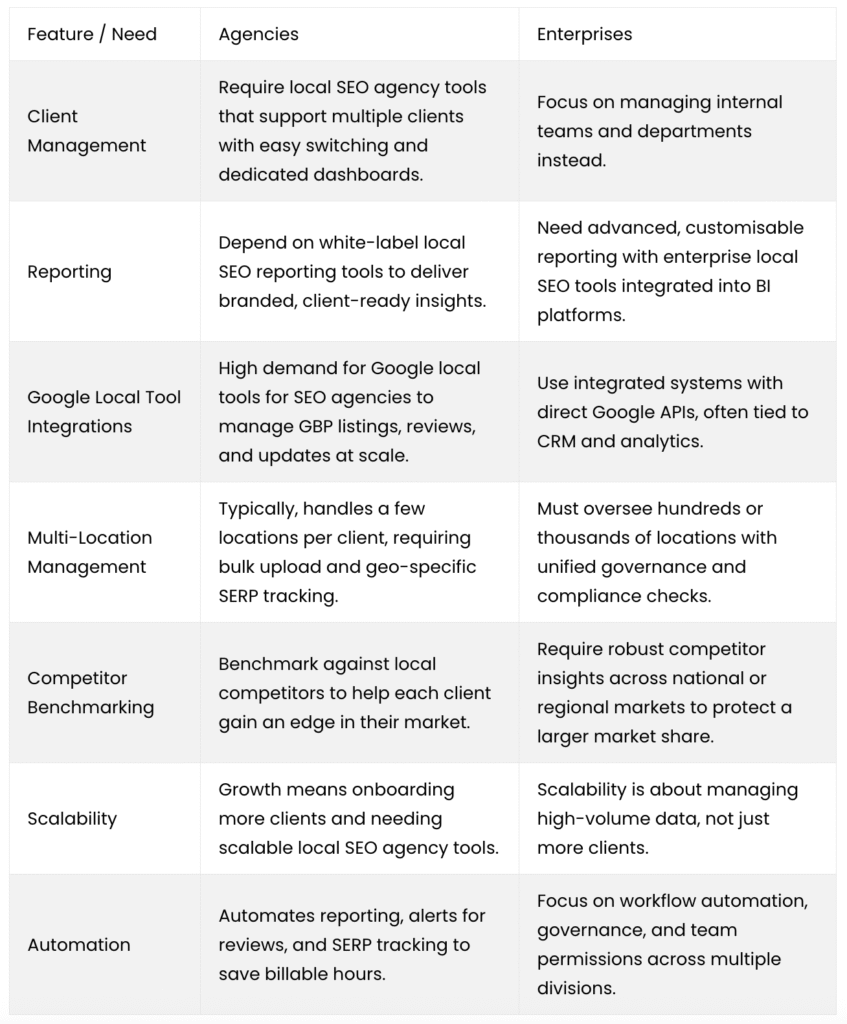
How to Choose the Best Local SEO Tool for Your Business
Dozens of local search marketing tools available in the market can make your selection challenging. You must evaluate which one is the best fit for your growth strategy that balances functionality, cost, and scalability.
- Budget and Scalability: Start with free local SEO tools if you’re testing the waters, but ensure your chosen platform can scale with multi‑location growth and increased reporting needs.
- Multi‑Location or Franchise SEO: If you run a chain, choose an enterprise-based local SEO tool designed to manage hundreds of listings, ensuring consistency across every branch.
- Level of Reporting Required: Small businesses may need basic dashboards, while agencies often demand white‑label reporting tools for clients seeking transparency and credibility.
- Integrations with Other Tools: Your local SEO tool must connect with CRMs, Google Analytics, and call tracking software to enable a unified view of marketing performance.
How to Track Local SEO Effectively
Simply setting up tools isn’t enough; success lies in consistent, smart monitoring. Tracking the right KPIs ensures you’re not just visible but also converting. Only then can you ensure that every marketing pound you invest delivers maximum ROI.
Some top metrics to measure include:
- Map Pack Rankings: Being in the “map pack” is the holy grail. Local SERP tools show whether you’re appearing in the critical top three.
- Listing Accuracy and Consistency: Search engines reward businesses with clean, consistent data. Even minor inconsistencies in your NAP details can hurt rankings.
- Review Volume and Sentiment: More positive reviews equal higher visibility. Local business SEO tools can help you monitor growth trends and customer satisfaction.
- Click‑Through Rates from Google Business Profile: A well‑optimised GBP listing drives clicks to your site. Monitoring CTRs highlights how engaging your content and offers are.
- Calls, Directions, and Site Visits: There are Google local tools for agencies and enterprises that will help them track direct customer actions from search listings.
Best Practices for Ongoing Tracking
Effective tracking is a habit, not a one‑time action. You must develop the art of reporting every action you take to scale your business or that of your clients organically using local SEO.
Generating reports is a time-intensive task, but thanks to the modern tools, your team can save much time and complete the hours’ job in a matter of a few minutes. Follow the best practices to keep tracking your online activities every day, so when the time comes for generating reports, you are already ahead with the necessary data.
- Weekly or Monthly Audits: Audit tools for local SEO to identify new issues with listings, reviews, and content optimisation.
- Geo‑Specific SERP Tracking: For ranking your website using local SEO, check out the related tools that will help monitor visibility across multiple locations and pinpoint performance drops.
- Monitor Competitors for Strategy Gaps: Regularly benchmark against rivals to adapt quickly to new strategies.
- Set Up Alerts for Negative Reviews or Profile Changes: Real‑time notifications prevent damage to reputation and rankings, ensuring proactive local SEO management.
Conclusion
Choosing the best local SEO tools in 2025 is no longer optional for businesses; it’s essential. Whether you’re a local agency, an enterprise with multiple branches, or a service provider looking to dominate map results, the right combination of local business SEO tools will save time, enhance visibility, and secure more qualified leads.
From geo‑grid mapping with Local Falcon and Local Vikings to full‑stack optimisation with BrightLocal and Semrush Local, every tool serves a unique need.
The key is to balance reporting, automation, and audit insights while ensuring your Google Business Profile remains accurate and engaging.
Pro Tip: Use a mix of a geo‑grid tracker (like Local Falcon), a citation builder (like Whitespark), and a reporting tool (like BrightLocal or Places Scout) to cover all bases.
FAQs
- What’s the main difference between standard SEO tools and local business SEO tools?
Ans. Standard SEO tools track national or global rankings, while local business SEO tools focus on proximity, Google Business Profile optimisation, and local SERPs. - How do I track local SEO effectively?
Ans. Use a local SEO ranking tool like BrightLocal or Local Falcon, paired with reporting tools such as Places Scout or Semrush Local, to monitor both rankings and engagement. - Which free local SEO tools are worth trying?
Ans. Google Business Profile is the best free option. You can also test Localo’s free tier before committing to a paid plan. - Are enterprise local SEO tools different from agency tools?
Ans. Yes. Enterprise local SEO tools (like GeoRanker or Places Scout) focus on governance, multi‑location dashboards, and bulk reporting, while tools for agencies (like BrightLocal) prioritise white‑labelling and client management. - What is the best local SEO tool for B2B companies in 2025?
Ans. It depends on scale. For SMEs, BrightLocal is often the best local SEO tool. For larger firms or multi‑location enterprises, GeoRanker or Semrush Local may be more suitable.






